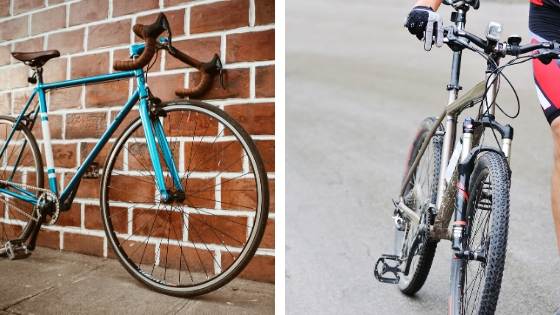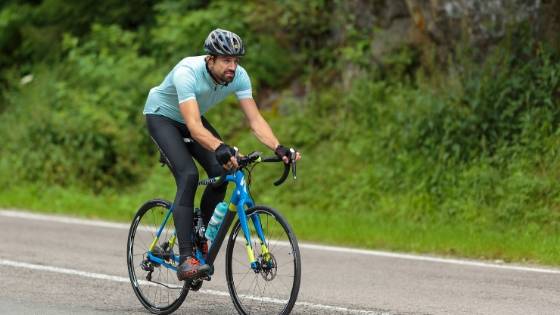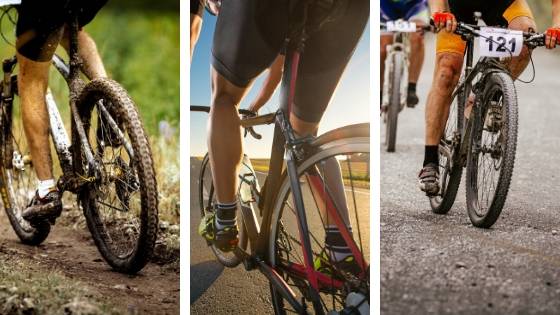
It’s not always a question of speed or distance when it comes to a great cycle ride. The positive impact on your health, both physical and mental, and absorbing some much-needed sunlight can be a more valuable benefit to cycling. Let’s not neglect the fantastic scenery you will witness during your ride outside.
Over a long distance you can expect to cycle over 2 miles further each hour on a road bike compared to a mountain bike. A road bike is typically faster than a mountain bike because it has a lighter construction, thinner tyres causing less friction between the bike and the surface and the bikes are cycled on the road where the terrain is flatter and smoother.
Although a road bike is faster than a mountain bike, there is some investigation required before the puzzle is solved. Let’s not discount the mountain bike because it has some tremendous advantages over a road bike and it’s a great alternative from the regular road cycling.
Here I will answer the question of why the road bike is faster, but I presented you with some pros and cons for both types of bikes.
Table of Contents
How Much Faster Are Road Bikes Than Mountain Bikes?
Generally, road bikes are 10 to 20% faster than mountain bikes. On average, a road bike will be 1 minute 20 seconds faster than a mountain bike over a mile distance. Therefore, a mountain bike will take 6 minutes to complete a mile and a road bike 4 minutes 40 seconds.
The reason, a road bike is typically 10lbs lighter than a mountain bike, they have thinner wheels and tyres, and the aerodynamic shape is designed for speed. If you ride a mountain bike and a road bike on a flat road surface, the road bike will be faster every time. However, unless you’re a professional at the top of your sport, either bike will give you great benefits and exercise, even for a hobby cyclist like myself.

Why Are Road Bikes Faster Than Mountain Bikes?
The first thing to understand and acknowledge, the road bike is designed to be cycled on the road. Typically you will discover the road covering is smooth and flat, which suggests you can cycle a lot faster for longer. The only thing stopping you from clocking up endless miles are stop signs, road junctions and other road users. However, many countries have designated cycle lanes which speed up your journey.
The construction of the road bike
The next thing to consider is the construction of the road bike, they use lightweight materials to reduce weight and increase speed. A road bike often has no suspension systems because the intention isn’t to cycle over uneven ground, meaning it can decrease its overall weight.
The handlebars are designed to place the cyclist in an aerodynamic position for optimal velocity and distance. The size of the wheels and tyres also have a significant impact on the speed of a road bike.
Thinner wheels and tyres support the road bike to travel quicker because it creates less friction with the surface below.
The fatter and heavier mountain bike tyres generate more fiction slowing the bike and making it a little harder to cycle in comparison to a road bike. The final point is the groupset. The groupset is related to any mechanical or electronic parts that are involved in braking, changing gear, or the running of the drivetrain. That means
- The shifters
- Brake levers
- Front and rear brake callipers
- Front and rear derailleurs
- Crankset
- Bottom bracket
- Chain
- Cassette
Road bikes have various ranges of groupset available, but they can become costly. The lighter weight, the more the price hikes up, and it will only reduce the weight be grams, not pounds. However, the mountain bike doesn’t always need lighter weight groupset because it’s built for power and strength. Overall the lighter weight construction of the road bike equips it with speed and faster riding in comparison to a mountain bike.

Different terrains
The road bike will hands-down beat a mountain bike on a flat smooth road surface, but when it comes to different terrain, the mountain bike is the victor. Gravel, mud, sand and even grass is no competition for a mountain bike, and the wide fat tyres are designed to eat up this terrain.
A super-sized suspension will prevent your bones from shaking, and stones and small rocks are easily cycled over. It’s here where the mountain bikes has the advantages over a road bike.If your cycling route can be taken off-road and shortens the distance, the mountain bike is more than capable of achieving it.
However, on a road bike, you must stay on the road, which might mean an extra few miles on your journey.
Furthermore, on a road bike, it can be comfortable riding at the same cadence across a longer distance. Yet take the mountain bike off-road, and your pace, cadence and effort must increase, potentially leading to a better workout.
Therefore, if your journey is entirely road and cycle path, then the road bike is going to get your to your destination faster but if you can shorten the course significantly by taking it off-road consider the mountain bike. Moreover, my most enjoyable rides have been the off-road ones where you have to think and navigate obstacles and challenges to reach the destination. For a holistic approach, consider both on alternate days.

Pros and Cons Road bike vs Mountain bike
In my opinion, there are pros and cons to both bikes, and some are easily recognised. Yet, regardless of the style of bike you decide, you won’t be disappointed with your decision. Both bikes are versatile and will provide you with excellent riding experiences and workouts. Nonetheless, let’s discover the pros and cons.
Cons
| Road Bike | Mountain Bike |
| Expensive – in comparison to the novice cyclist and customer a road bike will cost far more than a mountain bike. Additionally, extra gear can tally up with clothing and lighting being expensive. Winterising your bike and buying thermal underlayers make this cheap hobby expensive in the beginning. | Injuries or damages – at some point, whiles riding off-road, you will fall off your bike. These can lead to injuries and damages to your bike. The uneven ground and many rocks, stone, boulders, trees and other objects will collide with your mountain bike. Practice and patients are the best ways of avoiding crashes and if your riding a new and complexed route, take a buddy to support you. |
Flat tyres – the most frustrating problem for most road cyclist are flat tyres. The problem with riding on the highways or public cycle paths is there’s a lot of debris. The highway discards its debris on the sides of the road, in the way of your wheels. The thinner construction of the tyres results in far more punctured tyres. Typical on a long ride I will get one or two flats along the way. | Frequently cleaning – a mountain bike has an invisible magnet which attracts mud, dust and dirt and there’s no way of avoiding it. To keep your bike looking new and increasing its longevity, you need to clean it more frequently. It might not sound like a chore now, but after a hard ride, the last thing you want to do when you get home is clean your bike. |
| Knocked off your bike – the significant danger for road cyclist are other road vehicles. Unfortunately, thousands of cyclist are killed or injured each year from collisions with motor vehicles. Never take your eyes off the road and always anticipate other road users not seeing you. | Travel to off-roading site – depending on where in the world you live means you might not have direct access to some off-road sites. It could involve getting your bike into your car and travelling to a suitable location. When this becomes arduous each time you require a decent ride, your time on the bike diminishes. The longer you leave it, the hard it is once you get back on the saddle. |
Pros
| Road Bike | Mountain Bike |
| Long-distance – once your fitness and stamina are well developed, you can rack up some serious miles on a road bike. The road bike is well equipped to help you travel great distances and produces the speed towards a lengthy journey. There’s a reason why the Tour De France athletes cycle on a road bike because they are built for mileage and acceleration. | Comfortable ride – with front and rear suspension a far pleasant riding and the thick padded saddle on a mountain bike can be a delight to for your rear. The mountain bike is intended to take the shocks and bumps of rough terrain, and your upright position is better for your lower back. A few hours on a mountain bike feels more comfortable than a road bike. |
| Year-round cycling – you can almost cycle a road bike all year round. As long as your equipped with the correct clothing and lighting, you prepared to travel. The only weather I would consider avoiding is ice and snow. However, most roads are well maintained, and snow salts are used to dissolve these conditions. It won’t stop you for long. | Harder workout – the heavier and slower mountain bike over rough and challenging terrain will provide you with a harder and more active performance. Although you can ride easier on a mountain bike, and someone can go hard on a road bike if you were to compare both with the same effort a mountain bike will burn more calories even on the road. |
| Group cycling – one of my favourite things to do is group cycle, and it’s far easier on a road bike. The group can assist each other with aerodynamic, and the group can cycle close together. When you’re on the open highway, there’s no stopping a group from hunting down the miles. | Witness magnificent scenery – when you can get off the road and onto some off-road you will experience places and scenery you have never seen before. The road can get boring very quickly, so having the option to mix it up and get off-road is valuable for longevity. |
Conclusion
The initial question was are road bikes faster than mountain bikes, and I think the question has been solved. In an equal comparison on a highway, the road bike will performance faster than a mountain bike.
Nonetheless, there is far more to the question than first thought, and the critical part is you need to enjoy whichever mode of bike you use. My original statement is still correct its all about your physical and mental health improving regardless of the bike you use.
